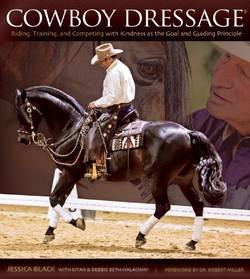Читать книгу Cowboy Dressage - Jessica Black - Страница 18
На сайте Литреса книга снята с продажи.
Emphasis on Kindness
ОглавлениеCowboy Dressage does not yet have a complete rulebook because it has grown naturally out of Eitan’s knowledge and the effort to base everything on the guiding principle of kindness. In order to meet the needs of an increasingly large community that demands more Cowboy Dressage divisions and tests every day, guidelines and rules for shows and judging are being developed, always maintaining kindness as a primary goal.
The rules and guidelines tend to be flexible. They are centered on the gradual progression toward a better relationship between horse and rider rather than on details of equipment. The most stringent rule is that you have to use a Western saddle. Most Western-style bits are acceptable as long as you use them kindly, although there are expectations regarding the level of training needed for a horse to be shown in an advanced bit (fig. 1.4). (More on that later. See p. 34 for details.)
1.4 – Jeff Sanders reassures his horse Simon during a Cowboy Dressage test. The most important part of Cowboy Dressage is the relationship between horse and rider. The emphasis on kindness is seen in the way riders reward their horses in Cowboy Dressage competition. A few soft strokes during the test can reassure and give confidence to the horse at the same time it gives the rider time to think.
Again, the focus is on the relationship between rider and mount. Cowboy Dressage competitions reward kindness, and not only because riders who treat their horses with kindness and respect will get more cooperation from their mounts. The results of treating the horse fairly on a daily basis will indeed be evident in his performance, but what the Cowboy Dressage judge is looking for is the calm demeanor and attentive attitude that are the immediate result of active kindness. As the new discipline becomes bigger with additional members, horse breeds, and styles, all competition tests and standards will be developed with reference to the central tenet of Cowboy Dressage: Be kind to your horse.
PATIENCE AND KINDNESS
The importance of kindness came as a revelation to Eitan and represented a sea change in his attitude toward himself, horses, and other people. Raised in the harsh conditions of Israel just before and after its statehood, Eitan’s early life was highly militaristic out of necessity. Kindness and softness were not in his vocabulary, except perhaps as descriptions of the weakness of people who would not survive or could not make it in their chosen profession.
He was raised according to the tenet Never Lie, and you just cannot be kind with that mentality. Meeting Debbie and falling in love with her was just a first step toward learning to appreciate the importance of kindness. Deb remembers struggling to make her husband understand that truth should never be an excuse to destroy someone; conversely, the kindness of little lies and oblique encouragement to overcome weaknesses works much more efficiently to help others become better horsepersons and better people.
At some point, not too long ago, Eitan “got it,” and like many people of strong convictions, swung from one extreme to another as soon as he realized how mistaken he had been. His early life in Rishon LeZion and his military experience had taught him that if you broke in the process of training, you weren’t worthy, and he applied this to the horses and humans he taught. But this does not work. In the long run, for every strong horse that turns into a superstar, you are going to lose many wonderful mounts that maybe needed a bit more time, a bit more patience, or a gentler approach.
People have lives beyond their horses, families, jobs, and the daily hassles we all experience. A little patience goes a long way when you are trying to teach someone, and one day, Eitan saw that clearly. He realized that he would be a better rider and a better teacher, as well as a better person, if he practiced patience and kindness. It was a moment of personal growth that was so surprising that it still feels new, “like it just came out of the package,” he says in wonder.
